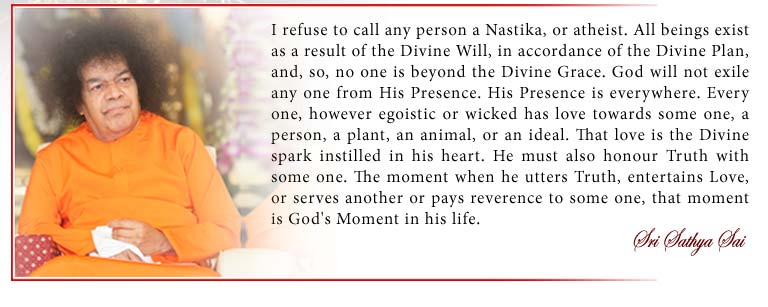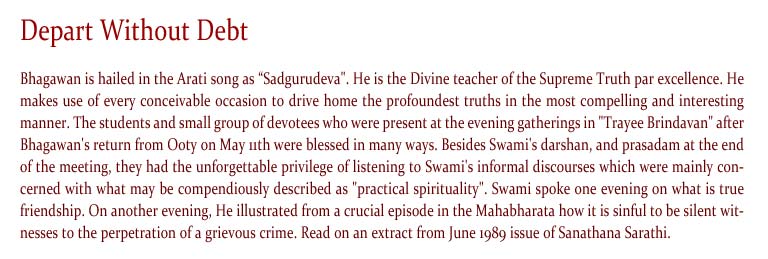 |
 |

One evening, Swami related instances from the lives of Socrates, the Greek philosopher, and Prophet Mohammed to pinpoint the lesson that one should not leave any undischarged debts before one passes away. In relating the story of Socrates in His own gripping manner, Swami described how the young men in Athens were attracted to Socrates because of the way in which he inspired in them a deep interest towards the basic problems of life. Because too many young men chose to remain with Socrates, the authorities in Athens condemned him to death. Rather than allowing himself to be put to death by others, Socrates chose to end his life by drinking a cup of hemlock. Swami described the last scene in which Socrates was surrounded by his numerous young disciples. With no fear of death, Socrates spoke to them cheerfully. Before receiving the cup of hemlock from the hands of his disciples, Socrates told one of them that he owed a hen to a neighbour. He asked the disciple to give a hen to his neighbour so that he may be free from any debt to anyone before his passing. He then received the cup of hemlock from the disciples' bands and drank it calmly. Incidentally Swami described how Alexander, a student of Aristotle—who was himself a pupil of Plato, the guru of Socrates—met an Indian ascetic during his invasion of India and learnt from the sage the supreme value of detachment (Vairagya) and the impermanence of worldly acquisitions. Referring to Prophet Mohammed's life, Swami described how on one occasion when the Prophet was fleeing from Mecca, he had to use the services of a camel-driver for carrying him across the desert. The Prophet had no money to pay to him at the time. Later, when the Prophet was about to leave the world, he called one of his disciples and asked him to discharge the debt the Prophet owed to the camel driver. Swami related these incidents to the students to impress on them how important it is in life to discharge one's obligations to others. The ancient Indian sages, Swami said, believed that if a person dies without discharging his debts he cannot escape the obligation to be born again to discharge the unpaid debts. Our ancients attached the highest value to honouring one's pledged word. Harishchandra was the supreme example of one who was prepared to undergo every kind of trial and humiliation to fulfill the promise he had given. Swami recited a Telugu poem which says: The signature is vital to a promissory note; True friendshipOne evening, Swami asked the students to define the characteristics of true friendship. Various answers were given and the examples of Krishna and Arjuna were cited. Bhagavan said that He wanted examples from human beings alone. The relation between Krishna and Arjuna was that of the Divine to man. Swami then gave the answer Himself and illustrated it with an example from ancient Italy. Swami said true friendship is present when the friends regard themselves as two bodies with one heart and soul. Swami then related the story of Damon and Pythias. Pythias had been sentenced to death by a ruler (of Syracuse) for an offence against the State. Pythias's friend, Damon, came to the ruler and said that as the sentence was to be executed a month later Pythias might be released from prison to see his wife and children. The ruler agreed to release Pythias on condition that Damon agreed to be in prison for a month and was willing to suffer the death sentence in case Pythias did not turn up on the due date. Damon readily offered to take Pythias's place. Pythias was freed and permitted to go home to meet his family. On the day prior to the date of execution a large crowd had gathered at the prison to see whether Pythias kept his word. Tension mounted as Pythias had not arrived by the evening. Damon was cheerfully ready to mount the scaffold in case Pythias did not turn up. Late in the night Pythias came running to the prison to save Damon from execution for his sake. The next morning the ruler was astonished at seeing both Damon and Pythias and was struck by the extreme devotion between the two friends. He pardoned Pythias and took both the friends into his service. Swami went on to say that such friendship was not to be found today. Most "friends" were fair weather friends who flocked around a person when he was prosperous or held a high position, but ignored him when he was down and out. Such "friends" were like frogs which gathered in a pond full of water but abandoned it when it was dry. Swami said God alone was the unfailing friend who could be relied upon to stand by the man of faith in weal and woe and protect him through all vicissitudes. Young people should not think that they could postpone thinking about God till their old age. No one can say when death will come. Only if one remembers God constantly all the time will he be able to remember God in his last moments. Who are sinners?Swami related at great length an important episode in the Mahabharata to convey a lesson regarding the role of persons who are silent witnesses to the commission of what they know to be a grievous wrong. Describing the incident in which Draupadi was dragged into the court of Duryodhana by Dussasana, Swami said that Draupadi made a passionate appeal to the elders present to declare whether the humiliation she was being subjected to by the Kauravas was in accordance with Dharma, the recognised principles of right conduct. All the elders, including Bhishma, Drona, Kripacharya and Ashwathama, remained silent. Vikarna, the youngest of the Kaurava brothers, was the only person who condemned the outrage that was being committed against a noble and virtuous Kshatriya princess. His words were dismissed as those of a callow youth. Swami pointed out that when a grave crime is committed, the sin is shared by four categories of persons. Apart from those who are the actual perpetrators of the crime, the others who share in the sin are those who are abettors or accomplices, those who instigate or encourage the commission of the crime and those who are silent witnesses to the crime though they know that a grievous crime is being committed. The lesson which Bhagawan drew from this episode for the students was that when any of them found a student misbehaving or disobeying the rules of the Institute, they should correct him on the spot and should not hesitate to chide him. To be silent or indifferent in such situations amounts to encouraging and abetting such misbehaviour.
|
 |